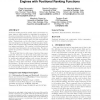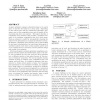779 search results - page 38 / 156 » Determining Time of Queries for Re-ranking Search Results |
SIGIR
2012
ACM
11 years 10 months ago
2012
ACM
Positional ranking functions, widely used in web search engines, improve result quality by exploiting the positions of the query terms within documents. However, it is well known ...
SISAP
2010
IEEE
13 years 5 months ago
2010
IEEE
Determining similarities among multimedia objects is a fundamental task in many content-based retrieval, analysis, mining, and exploration applications. Among state-of-the-art sim...
IPPS
1997
IEEE
13 years 12 months ago
1997
IEEE
The range tree is a fundamental data structure for multidimensional point sets, and as such, is central in a wide range of geometric anddatabaseapplications. Inthis paper, we desc...
SIGMOD
2003
ACM
14 years 7 months ago
2003
ACM
A query optimizer compares alternative plans in its search space to find the best plan for a given query. Depending on the search space and the enumeration algorithm, optimizers v...
TJS
2008
13 years 7 months ago
2008
XML is a flexible and powerful tool that enables information and security sharing in heterogeneous environments. Scalable technologies are needed to effectively manage the growing...


